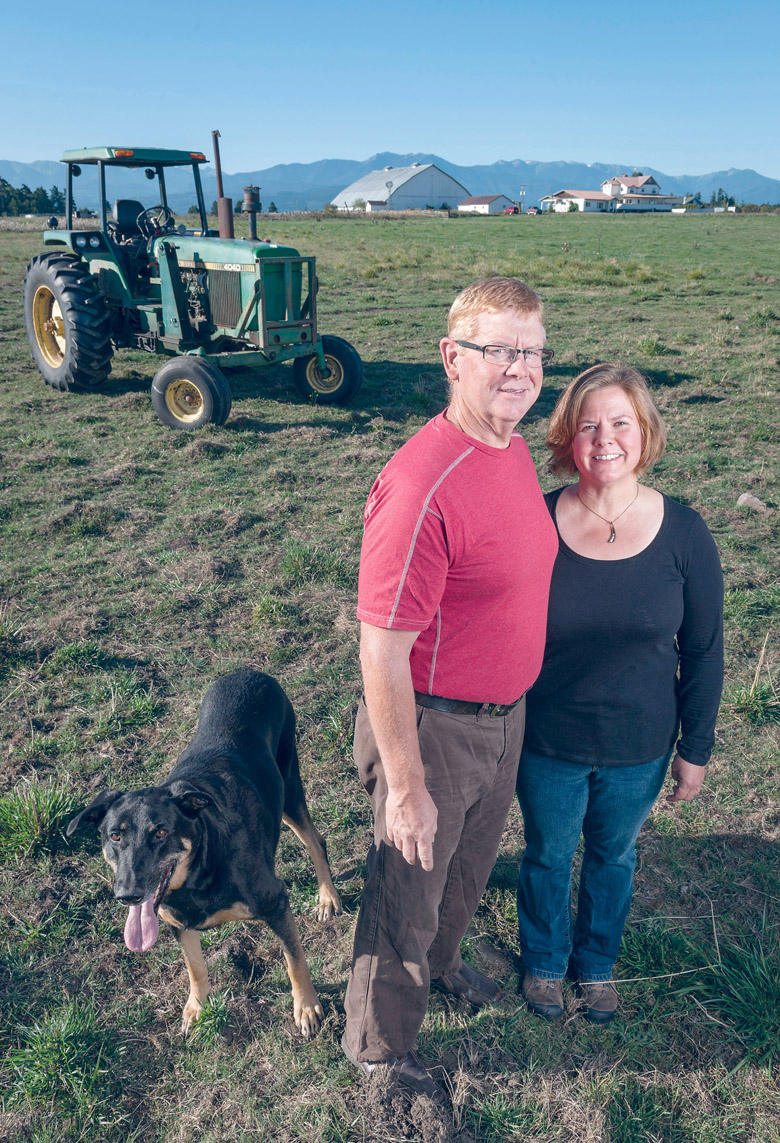SEQUIM –– The clutch is out on their tractor, the teenage farmhand needs to train a replacement so he can go hunting next weekend, and too many people want to buy their free-range meat.
Though Tom and Holly Clark are farming the same ground his great-great-uncle Willing King homesteaded, the operation of Clark Farms is definitely different.
“I’m not a fan of Facebook, but you just have to do it anymore,” Holly Clark said.
Maintaining a farm that ranks as the oldest in the state is a passion that drives the duo.
Both have “day jobs” that help feed their farming habit.
“He just loves these animals,” Holly Clark said of her husband.
“It’s a bit like an addiction.”
Farmers of Year
In recognition of the Clarks’ work on their farm at 863 E. Anderson Road north of Sequim, the North Olympic Land Trust is honoring them as the 2014 Farmers of the Year.
The award will be presented during the Friends of the Fields’ 15th annual 100-Mile Harvest Dinner, scheduled from 5 p.m. to 8 p.m. this coming Saturday.
“They have a long-term commitment to making sure their farm continues,” said Tom Sanford, land trust executive director, of the Clarks.
“It’s farmers like them who preserve agricultural lands here.
“[The Clarks’] impressive land stewardship ethic is a model for maintaining a strong farming community into the future.”
The award comes with free tickets for the Clarks to the harvest dinner, which will be at SunLand Golf & Country Club, 109 Hilltop Drive in Sequim.
A tickets for the dinner — showcasing food grown within a 100-mile radius — is $110.
The Farmer of the Year Award has honored a different North Olympic Peninsula farmer each year since 1999.
Tickets are available at www.northolympiclandtrust.org or at the office at 104 N. Laurel St., Suite 104, Port Angeles. No tickets will be sold at the door.
For more information, visit the land trust website, stop by the office or phone 360-417-1815.
Homestead in 1853
Clark Farms began with 160 acres of ground east of the Dungeness River that King acquired in 1853 as the first land patent in what was then Washington Territory.
He handed it off to his sister, Elise Clark – whose maiden name, Cline, also dots Dungeness landmarks — who willed it to her son, Thomas.
The pioneer farmers felled trees, busted stumps and cleared enough land to set up runs for beef and dairy cattle.
Tom Clark’s grandfather, Elliot, expanded the operation, adding turkeys, peas and introducing tulips that he eventually sold to farmers in Skagit Valley.
Nowadays, Clark Farms is known for the high-quality, grass-fed beef, pastured pork and heritage breed chickens and turkeys that are sold at farmers markets in Port Angeles and Poulsbo, as well as in area groceries.
Clark Farms meat also shows up on menus in restaurants across the North Olympic Peninsula and in the Seattle area.
The free-range method in which the Clarks raise their animals gives the meat a special attraction, the farmers said.
Not only is it good for the land, which they rehabilitate by rotating where they pasture their animals, but it also creates a richer, healthier fat in the animals, lowering the content of omega-6 fatty acids and increasing omega-3s, Holly Clark said.
“There’s good fat, and there’s bad fat,” Holly Clark said.
“There’s yellow fat that you see in meat from animals that have been allowed to graze, or you get that white fat from animals that are grain-fed or grain-finished.”
Use it all
To maximize revenue, the Clarks use every part of the animals they raise, selling bones to restaurants for soup-making and even rendering fat from their butchered animals to make soaps.
“It’s healthy, we don’t have to waste anything, and it feels a lot more humane to the animal,” Holly Clark said.
Tom Clark studied animal sciences at Washington State University but said the large-scale techniques he learned as part of a curriculum designed to maximize production did not fit their operation.
“We just don’t have that much land,” he said. “When you’re limited like that, you have to find ways to find extra value.”
So they work that niche.
They make sure their animals are free from antibiotics, added hormones and steroids — and they catch the premium price buyers are willing to pay for that meat.
________
Sequim-Dungeness Valley Editor Joe Smillie can be reached at 360-681-2390, ext. 5052, or at jsmillie@peninsuladailynews.com.

